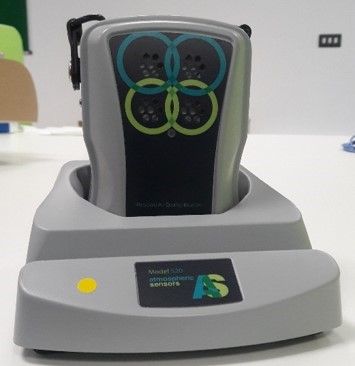Improving air quality monitoring in developing countries for better public health and higher quality of life (Ghana case study)
10/02/2018

According to the World Health Organisation (WHO), 6,500 people die every year in my home country of Ghana as a result of poor air quality. This is a staggering number, especially for a country of less than 27 million people. What’s more, it is rarely featured in the media, and yet malaria, HIV-AIDs and the big six “killer” diseases feature regularly. This, in part, is why I decided to undertake a research degree with Cranfield University.
Air pollution is a major risk factor in human health, and is damaging to our climate, ecosystems and agriculture. In children, it affects cognitive development, harming their future prospects and contributions to society. It is also a large economic burden, as it is linked to an increase in both the number of deaths and morbidity. There is, however, a lack of scientific evidence on sources of air pollution in developing economies, which is a fundamental requirement for the development of environmental policies and guidelines. This is because air quality monitoring is difficult in developing economies for a number of reasons, including mismanagement of resources, lack of governmental support, lack of expertise with current technical know-how, expensive “traditional” air quality monitoring equipment and a lack of adequate regulation and enforcement of laws where they do exist.

Air pollution in Ghana
In the light of this, my research seeks to use cutting-edge, low-cost, high-density network environmental and remote-sensing technologies to develop regionally specific methodologies for air quality monitoring in logistically difficult environments. These sensors, developed by Atmospheric Sensors Limited (ASL) UK, offer us the opportunity to collect air quality data at a faster rate, both accurately and in near-real time (active). The sensors are robust, operate on low-power and are easy to use. And, compared to the “traditional” air quality monitoring sensors, they do not require infrastructure for operation. In addition, the measurements from these sensors are transferred via GPRS and can be accessed anywhere in the world. The inbuilt GPS offers us the opportunity to record the location and time, which can help to develop appropriate models for air quality forecasting that are regionally specific – all really helpful for the scientists and institutions around the world that are supporting countries like Ghana to improve their air quality and, ultimately, people’s lives.
[su_column size=”1/3″]
Mobile air quality sensor
In the short term, my research will determine which air quality monitoring methodologies are the most appropriate to address this problem. It will also help to develop policy that will inform appropriate authorities on the development and implementation of environmental guidelines, and also to regulate the use of this emerging technology for air quality monitoring. In the long-term, I am confident that the quality of life in these regions will be improved as the resources in the environment will be sustainably used to harness growth and development, free from air pollution. And that means improved life prospects for my compatriots, and when the learnings are shared further afield, for all the citizens of the world.
Categories & Tags:
Leave a comment on this post:
You might also like…
Keren Tuv: My Cranfield experience studying Renewable Energy
Hello, my name is Keren, I am from London, UK, and I am studying Renewable Energy MSc. My journey to discovering Cranfield University began when I first decided to return to academia to pursue ...
3D Metal Manufacturing in space: A look into the future
David Rico Sierra, Research Fellow in Additive Manufacturing, was recently involved in an exciting project to manufacture parts using 3D printers in space. Here he reflects on his time working with Airbus in Toulouse… ...
A Legacy of Courage: From India to Britain, Three Generations Find Their Home
My story begins with my grandfather, who plucked up the courage to travel aboard at the age of 22 and start a new life in the UK. I don’t think he would have thought that ...
Cranfield to JLR: mastering mechatronics for a dream career
My name is Jerin Tom, and in 2023 I graduated from Cranfield with an MSc in Automotive Mechatronics. Originally from India, I've always been fascinated by the world of automobiles. Why Cranfield and the ...
Bringing the vision of advanced air mobility closer to reality
Experts at Cranfield University led by Professor Antonios Tsourdos, Head of the Autonomous and Cyber-Physical Systems Centre, are part of the Air Mobility Ecosystem Consortium (AMEC), which aims to demonstrate the commercial and operational ...
Using grey literature in your research: A short guide
As you research and write your thesis, you might come across, or be looking for, ‘grey literature’. This is quite simply material that is either unpublished, or published but not in a commercial form. Types ...






